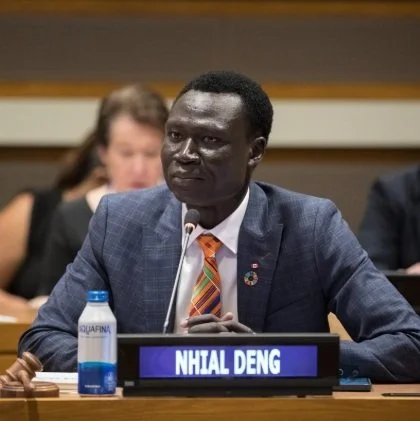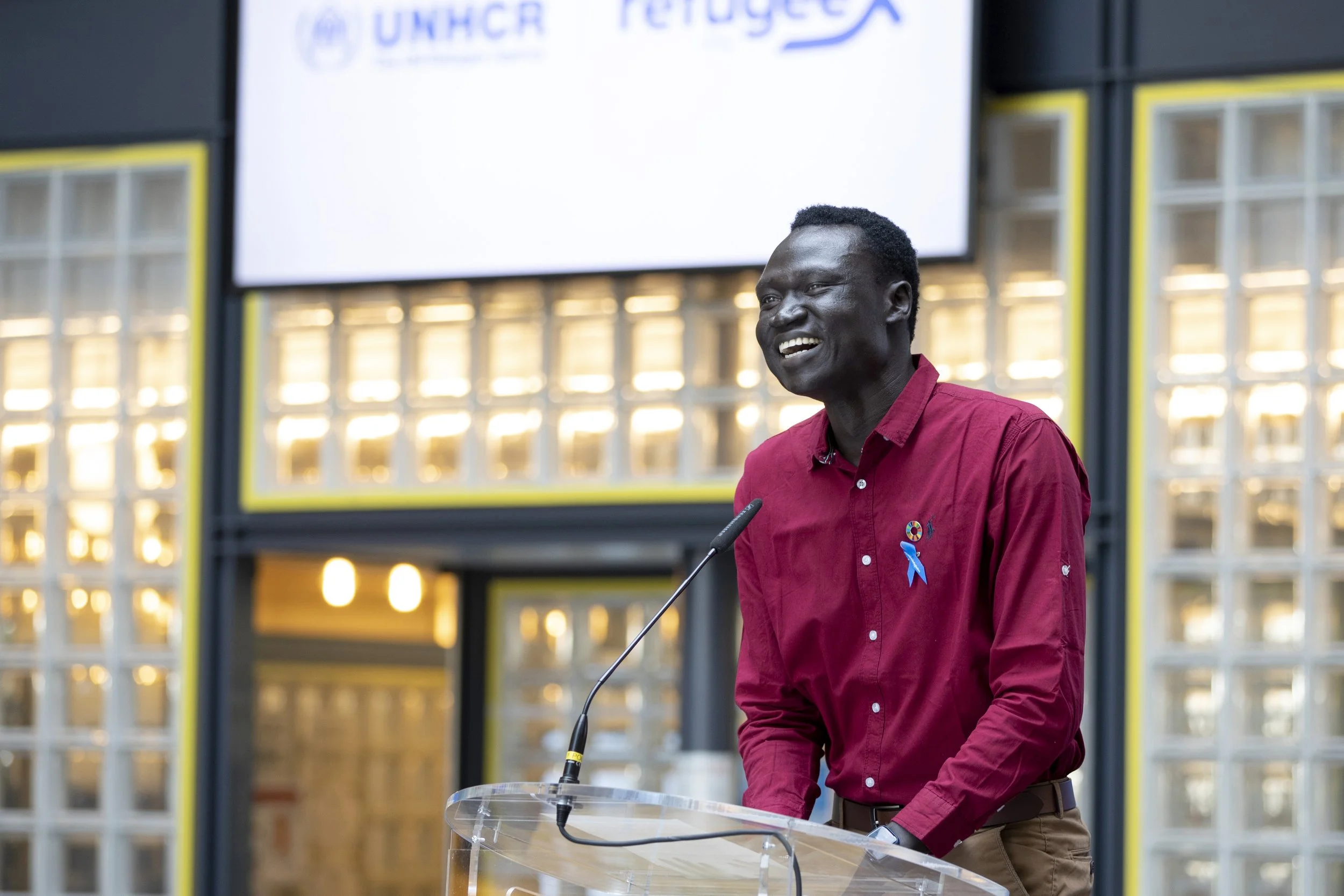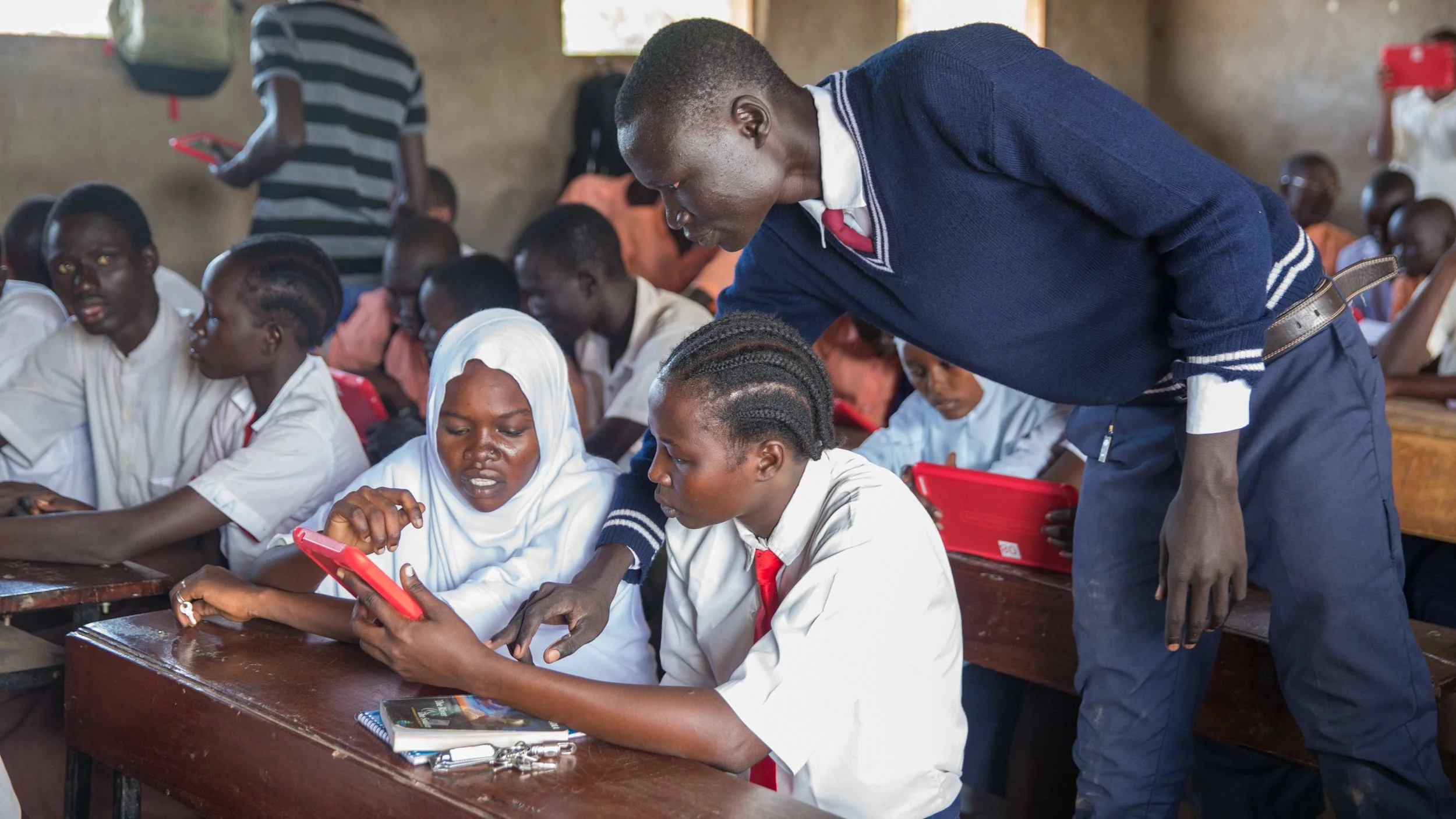Nhial Deng
Pronouns: He/Him
Organisations: Refugee Youth Peace Ambassadors (RYPA); UNHCR Global Education Taskforce; Advisory Board of the East African Centre for Forced Migration and Displacement
Country of origin: South Sudan
Profile
Nhial Deng is a South Sudanese refugee rights and community activist. He was born in Ethiopia after his family fled the first Sudanese civil war. Following an attack on his village, he sought refuge in the Kakuma refugee camp in Kenya, where he lived for 11 years before moving to Canada on a full scholarship for his undergraduate studies. In Kakuma – a densely populated camp with over 200,000 refugees from more than 10 different nationalities – Nhial recognised that trauma and anger among young people was caused by the brutal images of war and violence they had witnessed in their home countries. He saw a need for a space to share these traumatic experiences, to bridge differences and transform this anger into mutual understanding and joint dreams. Out of this sentiment, Nhial started leading peacebuilding workshops and became the founder of the Refugee Youth Peace Ambassadors (RYPA) organisation.
RYPA aims to create a vibrant network of young peacebuilders who will promote peace in their own communities and seeks to provide them with the essential resources to do so. The organisation consists of full-time staff, 30 volunteers, and 50 community ambassadors, who coordinate projects such as ethical leadership training and conflict mitigation initiatives in order to reduce intercommunal violence. Nhial currently resides in Canada and handles the organisation’s external relations, leveraging resources for Kakuma and advocating for the refugee cause. The RYPA also collaborates with other organisations such as Global Changemakers and World Vision Kenya. Their cooperative efforts include youth empowerment activities and tailoring their input to Kakuma’s unique needs. Nhial is also active as the refugee representative on the UNHCR Global Education Taskforce and sits on the Advisory Board of the East African Centre for Forced Migration and Displacement.
Story
‘I firmly believe that young people have the capacity and passion to contribute to peacebuilding worldwide. They should be part of peacebuilding discussions because the future is ours,’ Nhial Deng said. He believes the Kakuma refugee camp, where he once lived, could produce the next Martin Luther King, Jr. or Nelson Mandela. He said, with the right skills, its young people could become leaders who promote inclusivity and peace in their home communities, which are ravaged by ethnic and political tensions. Nhial said these tensions frequently arise from cultural differences and the spread of misinformation. To address this, his organisation provides social media training to curb the dissemination of false information that might escalate conflicts. The sports programmes they provide also play a crucial role in easing tensions and building mutual understanding. He said, by fostering friendships based on sports rather than background, young participants are encouraged to bring this spirit of unity back to their communities, promoting peaceful intercommunal coexistence.
Nhial said his peacebuilding efforts have changed his perspective about the idea that people with cultural differences cannot live together. His work fuels his confidence in the role youth can play as agents of positive change and social transformation. He now believes that differences and tensions are natural, and that peace means resolving these differences in ways that avoid destructive conflict which harms individuals and communities.
Nhial said, one of the main challenges his organisations face is ageism, when older people look at them as naïve high school kids. They are questioned about how they would manage money and apply for grants, and about their knowledge of peacebuilding and leadership as young people. Nhial emphasised the importance of being humble and not positioning oneself as an expert, especially in a large group where everyone can learn from each other. He said, instead, he focuses on experiential learning. He said, ‘I don’t have a lot of skills in leadership, and I’m still learning every day. But that small amount of knowledge in project management and social justice that I do have, I can pass that on to another young person.’ Nhial said it is important to prioritise quality over quantity. He believes it is far more impactful to engage in a project that can profoundly transform a single life and make a tangible difference than to involve 10,000 people in an initiative that accomplishes little. He said, ‘To change the whole world in a day, you can’t achieve that, right? It’s one life at a time. It is a journey, not a one-day process. It involves a lot of negotiations and a change of mindset and perspective.’
Nhial said maintaining a positive attitude in the face of disappointment is vital for young peacebuilders. He views such instances not as failures but as opportunities for growth. He said, ask yourself, ‘What can I learn from this to make my next project better?’ Nhial believes personal challenges are an inevitable part of the journey. He said, ‘As long as the passion is there and you take care of your mental health, as well as communicate your boundaries to your colleagues, you will overcome these challenges and be proud of what you achieved.’




